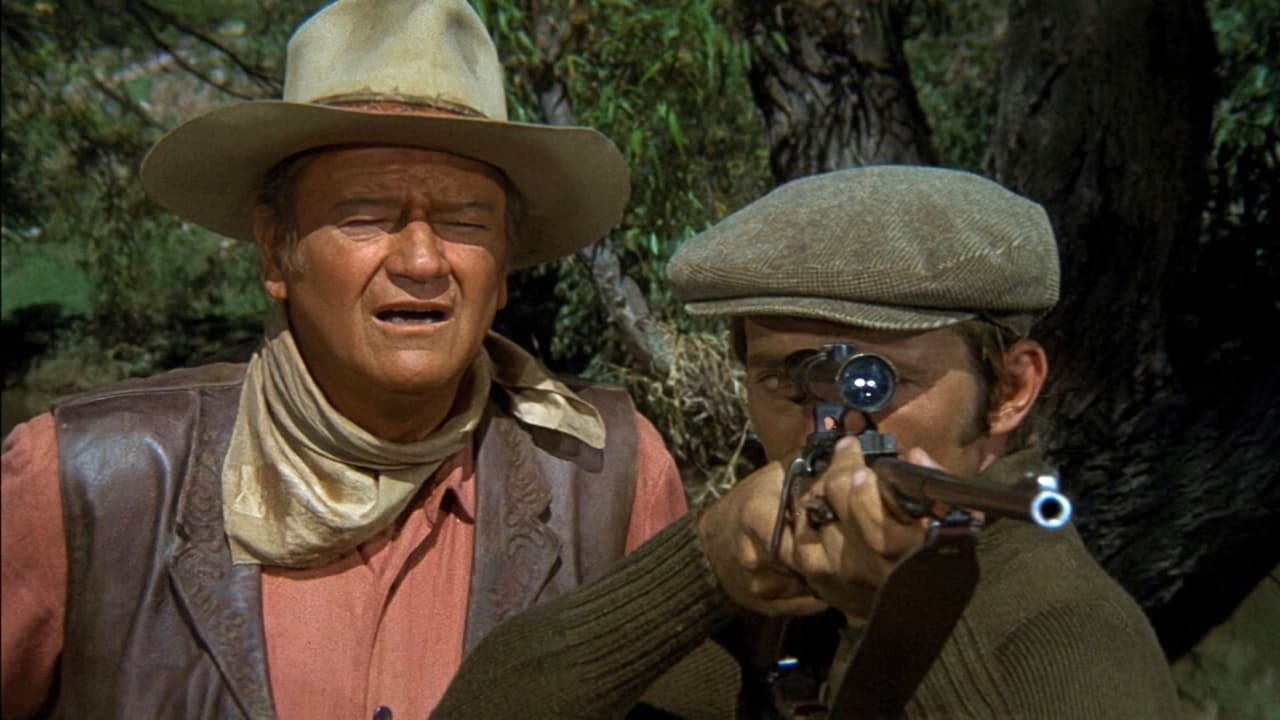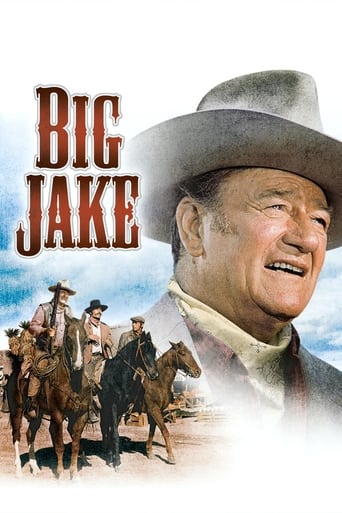

(Flash Review)John Wayne plays a cowboy named McCandles, great name, in this Western that highlights the trend away from horses to cars and motorcycle. It opens in 1909 with eight bandits who approach vast ranch estate and murder many workers and kidnap the mother's grandson for a random of $1mil. Not just any grandson, a grandson of McCandles who has been away from the family for many years. The mother calls back McCandles to handle the job of rescuing the grandson and make sure the ransom makes it to its destination safely. Will anyone doubt McCandles at accomplishing his task and will he have any tricks up his sleeve? This was a solid story as a basis some good shootouts, snappy dialog and splendid natural cinematography. Pure John Wayne.
... View MoreBIG JAKE is another solid western for the dependable John Wayne, here playing up his age as an old-time gunslinger drawn back into action once more when his own son is kidnapped. The film charts the progression of the Old West with the advent of new technology; I never thought I'd be watching motorbike stunts in a John Wayne movie! I loved Wayne's character in this one, as his one-liners are tougher than ever and he has lots of little neat touches, like needing his glasses to read anything and sticking to short-range weapons due to his failing sight. The rest of the story is familiar but the cast is well populated by familiar faces and the action hits home.
... View MoreAs I sit here thinking about the movie, the question that keeps popping up is 'who was Little Jake's father?'. At the shootout to end the story, he calls James (Patrick Wayne) 'Uncle Jim', and Michael (Christopher Mitchum) was obviously too young. Process of elimination would make the wounded McCandles brother Jeff (Bobby Vinton) his Dad, but that was never firmly established, and I don't recall Jeff ever reacting to the kidnapping like Jake was his own son. So what gives? If anyone can answer, we can start in on who was Little Jake's mother.I liked the way the story mixed in elements of humor to move the story forward. The buckshot butt scene was comical, and hearing John Wayne sing in Spanish in the shower was a bit offbeat for the film star. I don't think I've ever seen Wayne sing in a picture, so that was an interesting touch. Dog's (Dog?) role was a welcome addition to the story too, but it was a little distracting whenever his coloration seemed to change from time to time. Still, a dog that loyal comes highly recommended.I'm on record in some of my other reviews for preferring the old Paladin himself, Richard Boone as a Western villain. He seems more colorful as an outlaw and certainly has the craggy features to pull off the bad guy role. His 'thought you were dead' line to Big Jake at the finale was priceless; the film needed that closure to fulfill one of Big Jake's promises earlier in the story.All in all a decent John Wayne Western, establishing his character right up there with the likes of J.D. Cahill and Rooster Cogburn. Now if we can get the Little Jake mystery cleared up we'd be all set.
... View MoreFrom its documentary style opening, Big Jake delivers big fun, big adventure, nasty villains, whippersnapper sons and classic John Wayne. This movie has something for everyone, but be warned it has plenty of violence and is definitely a PG/ PG13 type film.The supporting cast is excellent with Patrick Wayne, Christopher Mitchum, Richard Boone,Bruce Cabot, Maureen O'Hara, Gregg Palmer and Dog turning in solid performances.While there are the formulaic elements such as horrendous acts perpetuated by bad men that give license to the good guys to do whatever is necessary to right the wrong, Big Jake also has other elements that make this film not just another Western:1) Takes place in transition period of the turn of the century which provides some interesting interaction between the old ways and new ways. 2) Fun relationships and interplay between an estranged father and his young adult sons. 3) Great mixture of fun and intense gritty action. (John Wayne movies are known for this)Consequently - If you like Westerns this is a classic that you will enjoy.If you are a fan of John Wayne at all this is a must see film.If you are just looking for a good gritty action film with a healthy dose of humor seamlessly woven in to the story you will not be disappointed.Ultimately, this is one of my favorite John Wayne films.
... View More